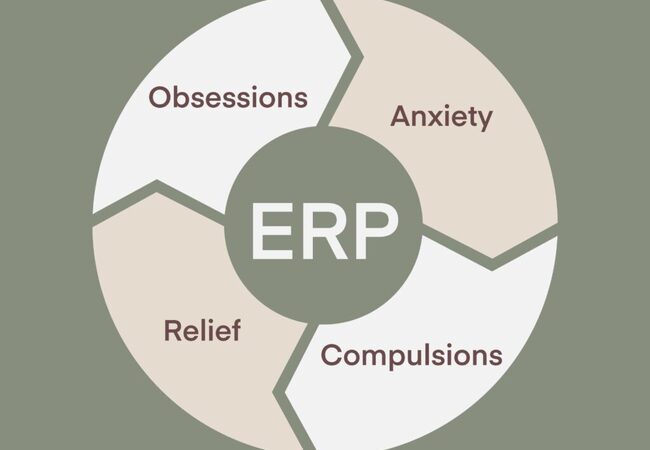December 23, 2024
Exposure and Response Prevention Therapy in the Therapeutic Community
By Nicole Holmes, LISW-S
Exposure and Response Prevention (ERP) therapy is a highly effective treatment for Obsessive Compulsive Disorder (OCD). It engages individuals in confronting their fears and breaking free from the cycle of obsessive thoughts and compulsive behaviors present within OCD. The Hopewell ERP group provides structure, guidance, encouragement, and support within a therapeutic environment.
What is Obsessive Compulsive Disorder?
Obsessive Compulsive Disorder is a diagnosis in which people have unwanted thoughts and fears (obsessions) which cause them to perform repetitive actions and behaviors (compulsions). The obsessive thoughts are sometimes referred to as intrusive thoughts because they are not wanted and often do not align with the person’s own sense of self or morality. OCD is often categorized into different subtypes including checking, counting, contamination, pedophilia, symmetry, scrupulosity, and false memory.
Let’s look at one common situation. An individual with OCD might have an obsessive thought of “my door might be unlocked,” which results in a compulsive “checking” behavior such as returning home multiple times to test that the door is locked. The obsessive thought that the door might be unlocked creates a sense of uncertainty that is so distressing it feels intolerable for those with OCD. The compulsive behavior of checking that the door is locked provides temporary relief of that distress, thus creating a cycle that does not end.
Everyone may occasionally forget if they locked their door or perhaps left the stove on, resulting in a need to come home to check. However, with OCD, these thought patterns and behaviors tend to be so intense that they significantly impact a person’s ability to perform daily activities and diminish their quality of life.
What is Exposure and Response Prevention?
Exposure and Response Prevention, or ERP, is a form of Cognitive Behavioral Therapy that is specifically designed to help people suffering from OCD, although it can be useful for other diagnoses as well like social anxiety. Under the supervision of a specially trained therapist, ERP works to expose individuals to their obsessive or intrusive thoughts while delaying in engaging compulsive behaviors or mental acts. The goal is to build tolerance and habituate to the feelings of uncertainty that exist when exposed to the obsessive thought (Exposure) without engaging in the compulsion (Response Prevention). This is done through repeated and often graded exposures that trigger the distress connected to the obsessive thought while delaying the ability to engage in the compulsion.
Going back to our situation of “my door might be unlocked” and applying ERP to it could look a few different ways. One way would be to postpone checking the door for a predetermined amount of time and once that time has ended allowing the checking compulsion to occur. The goal would be to gradually increase the amount of time postponing the checking compulsion until it no longer provides a sense of relief from the distress. Another way might be to add a “ritual tax” where you must engage in another task whenever you engage in the checking compulsion. This might look like putting your hands in the air and spinning in a circle twice while saying “I’m engaging in a compulsion” every time you check to make sure the door is locked. The goal of this would be to make the checking compulsion less appealing to the point that the uncertainty (distress) of “my door might be unlocked” is the favorable option.
What is a Therapeutic Community?
The philosophy of a therapeutic community is that each resident feels empowered to be an active participant in their own recovery as well as in the recovery of other residents through any and all day-to-day activities. Therapeutic community at Hopewell shows up in the daily care of farm animals, the caretaking of our grounds, and support given and received within therapy groups. Staff and residents alike engage in meals and community building activities together. The ideology behind a therapeutic community is the cornerstone to Hopewell’s program model.
How Does a Therapeutic Community Impact ERP Therapy?
Hopewell’s therapeutic community naturally provides a level of support for those engaging in the difficult work of recovery, especially exposure work. ERP work should always be somewhat challenging and at times even daunting. Willingly putting oneself into a triggering situation can be very distressing, which is why ERP should always be done with a specially trained therapist.
At Hopewell, individuals benefit from the support of both trained staff and the entire therapeutic community. ERP group members can be seen wandering the grounds together, supporting one another as they engage in exposures. ERP group at Hopewell looks a little different every day. Most days members are doing exposure work in group with the support of other group members. Participating in group exposure work can include doing exposure lotteries, where group members create exposure slips and put them in a box to draw from at random. Another activity is the wheel of exposure, where group members spin a wheel. If it lands on a hard, medium, or easy exposure they will then engage in it with the support of the group.
The organic experiences one naturally has while a member of the Hopewell community translate into applicable exposure work. The Hopewell community supports those in ERP in building their mental fitness naturally while gaining support socially.
Back to Blog
